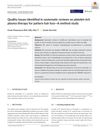 57 citations,
October 2021 in “Journal of ethnopharmacology”
57 citations,
October 2021 in “Journal of ethnopharmacology” Indian herbal medicine shows promise for treating skin diseases but needs more research to prove effectiveness.
13 citations,
May 2021 in “FASEB bioAdvances” Plant-based products can improve hair and skin health without harmful side effects.
 6 citations,
May 2020 in “Nutrients”
6 citations,
May 2020 in “Nutrients” Eating fewer calories may slow skin aging and improve skin health through various biological changes.
 October 2023 in “Annales Academiae Medicae Silesiensis”
October 2023 in “Annales Academiae Medicae Silesiensis” Saw palmetto extracts might help treat male hair loss and need more research.
 53 citations,
February 2020 in “Expert Opinion on Pharmacotherapy”
53 citations,
February 2020 in “Expert Opinion on Pharmacotherapy” Finasteride and minoxidil work best together for hair loss.
 15 citations,
May 2020 in “Journal of Dermatological Treatment”
15 citations,
May 2020 in “Journal of Dermatological Treatment” PRP treatment increases hair density and thickness in androgenetic alopecia by 79%.
 1 citations,
January 2024 in “Journal of Cutaneous and Aesthetic Surgery”
1 citations,
January 2024 in “Journal of Cutaneous and Aesthetic Surgery” Fractional CO2 laser with topical triamcinolone is more effective and safer for treating alopecia areata than intralesional triamcinolone.
 1 citations,
November 2022 in “Journal of Dermatological Treatment”
1 citations,
November 2022 in “Journal of Dermatological Treatment” Platelet-rich plasma can increase hair density and may help treat some skin conditions, but it's costly, not FDA-approved, and needs more research.
26 citations,
February 2015 in “Pediatric blood & cancer” Targeted anticancer therapies in children often cause skin side effects like rash and dry skin.
 1 citations,
February 2017 in “Journal of gynecology and womens health”
1 citations,
February 2017 in “Journal of gynecology and womens health” The document concluded that more research is needed to understand how estrogen affects the enzyme involved in hirsutism development.
 April 2024 in “Lasers in medical science”
April 2024 in “Lasers in medical science” Lasers and light therapies are effective in promoting hair regrowth for different types of hair loss.
 40 citations,
October 2012 in “British Journal of Dermatology”
40 citations,
October 2012 in “British Journal of Dermatology” Minoxidil helps regrow hair in female pattern hair loss, but more research needed for other treatments.
 1 citations,
July 2017 in “Clinical research in dermatology”
1 citations,
July 2017 in “Clinical research in dermatology” Hair loss, known as Androgenetic Alopecia, is often caused by hormones and can be diagnosed using noninvasive techniques. Treatments include topical minoxidil and oral finasteride, with new treatments being explored. There may also be a link between this type of hair loss and heart disease risk.
 November 2024 in “Health Science Reports”
November 2024 in “Health Science Reports” Light/laser therapy can effectively increase hair density in some types of alopecia, especially androgenic alopecia and alopecia areata.
 October 2021 in “Cosmoderma”
October 2021 in “Cosmoderma” Hair loss can be managed with treatments like minoxidil, finasteride, and others, but there are still gaps in effectiveness and off-label usage is increasing.
 116 citations,
February 2017 in “Journal of the American Academy of Dermatology”
116 citations,
February 2017 in “Journal of the American Academy of Dermatology” JAK inhibitors help with skin conditions but need more research on dosing and safety.
 19 citations,
March 2018 in “Expert Opinion on Drug Safety”
19 citations,
March 2018 in “Expert Opinion on Drug Safety” Most treatments for spondyloarthritis are safe, but monitoring and careful selection based on patient risks are important.
 June 2022 in “Frontiers in Medicine”
June 2022 in “Frontiers in Medicine” Acupuncture and moxibustion may help treat hair loss, but more research is needed.
 343 citations,
December 2008 in “Endocrine Reviews”
343 citations,
December 2008 in “Endocrine Reviews” Metformin helps with menstrual cycles and insulin levels in PCOS but is less effective for hair growth, diabetes prevention, and weight loss, and may improve fertility and reduce diabetes risk.
 8 citations,
August 2019 in “Dermatologic surgery”
8 citations,
August 2019 in “Dermatologic surgery” Nonsteroid treatments for alopecia areata show promise but need more high-quality research.
2 citations,
June 2023 in “Journal of clinical medicine” Soy supplements improve various skin conditions and aging signs, with topical use boosting skin barrier function.
 66 citations,
June 2013 in “Journal of Dermatological Treatment”
66 citations,
June 2013 in “Journal of Dermatological Treatment” Finasteride and dutasteride effectively treat hair loss, but may cause side effects like sexual dysfunction and depression.
April 2020 in “Research Square (Research Square)” Oral contraceptives with cyproterone acetate improved quality of life for women with PCOS more than those with levonorgestrel.
 December 2019 in “Journal of cosmetic dermatology”
December 2019 in “Journal of cosmetic dermatology” Systematic reviews on platelet-rich plasma therapy for hair loss have many quality issues.
1 citations,
January 2022 in “Annals of Dermatology” Dutasteride is more effective than finasteride for long-term hair growth in men with androgenic alopecia.
 April 2022 in “International Journal of Health Sciences (IJHS)”
April 2022 in “International Journal of Health Sciences (IJHS)” A holistic treatment approach, including yoga, diet, exercise, and mindfulness, can effectively manage PCOS symptoms.
 213 citations,
June 2017 in “Rheumatology”
213 citations,
June 2017 in “Rheumatology” The guidelines suggest a detailed approach to diagnosing and treating lupus, with a focus on regular check-ups, personalized medicine, and a range of drug options for different cases.
317 citations,
April 2018 in “Journal of steroid biochemistry and molecular biology/The Journal of steroid biochemistry and molecular biology” PCOS is a complex condition in women that can lead to health issues, and lifestyle changes are the best management approach.
 60 citations,
December 2015 in “Lasers in Medical Science”
60 citations,
December 2015 in “Lasers in Medical Science” Low-level laser therapy is safe and can increase hair growth for male and female pattern hair loss.
 16 citations,
September 2020 in “British journal of dermatology/British journal of dermatology, Supplement”
16 citations,
September 2020 in “British journal of dermatology/British journal of dermatology, Supplement” The article suggests that targeting specific immune pathways could help control and treat the skin disease hidradenitis suppurativa.
























